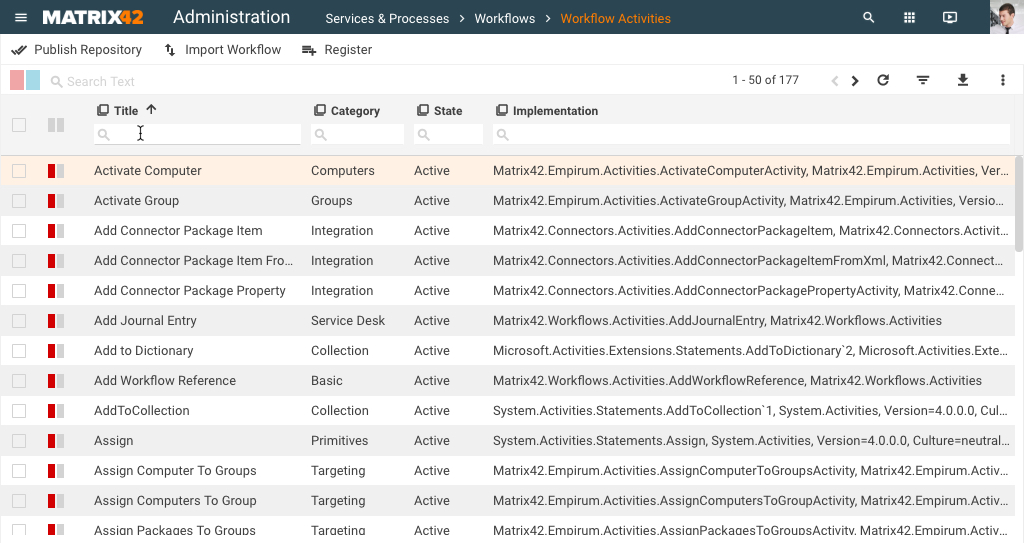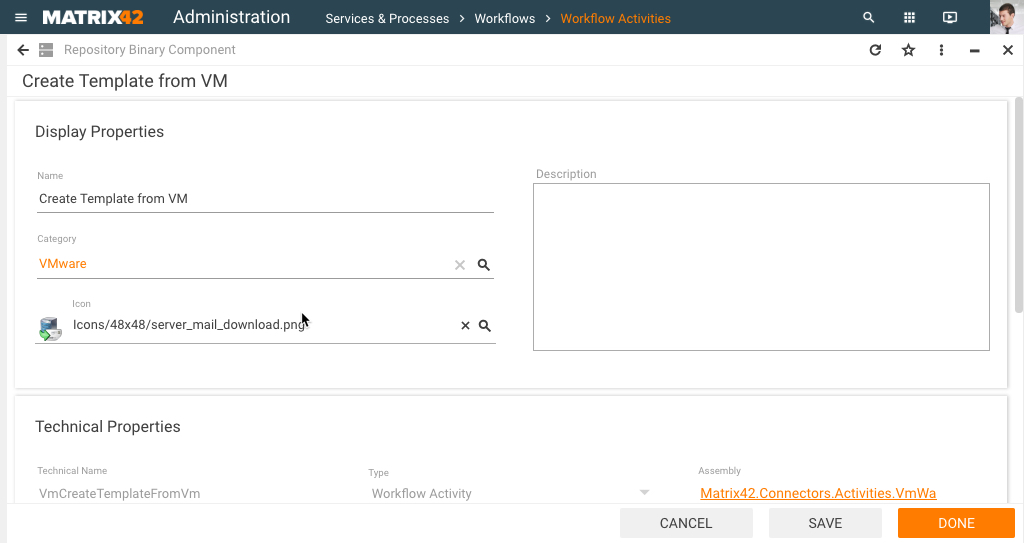Manage Workflow Activities
Overview
The Workflow Activities search page lists all the available workflow activities and provides the search criteria - Title, State, Category, and Implementation - for filtering them. Click the name of the column, e.g. Title or Category, to filter the grid by this column, A-Z; click it again to filter the grid by this column Z-A.
The grid layout displays the following information:
- Quick Filter: Red rectangle = System; Light blue rectangle = Custom.
- Title of the workflow activity.
- Category of the workflow activity.
- Status of the workflow activity.
- Implementation (internal technical name).
Object Details (when a workflow activity is selected) display the following information:
- Name of the workflow activity
- Status of the workflow activity
- Type of the workflow activity
- Category of the workflow activity
- Date of the workflow activity creation
- Matrix42 Worker Compatible
- Execute Only on Server
Configuration Item "Repository Binary Component"
The properties dialog of a Repository Binary Component displays all meta-information of a workflow activity. This meta-information can be modified (partly) by an administrator directly in Matrix42 Software Asset and Service Management. The dialog also shows the incoming dependencies of the Repository Binary Component.
General Dialog Page
| Name | Display name (title) of the activity which will be used on the corresponding search pages of Matrix42 Software Asset and Service Management. |
| Category | Workflow category used. |
| Icon | Icon that will be displayed on the search pages and in the Workflow Studio Repository. |
| Description | Detailed description of the activity (e.g. what will be done inside the activity, for which circumstances it can be used etc). |
| Technical Name (read-only) | Internal name of the activity. |
| Type (read-only) | Type of the binary component (e.g. Workflow Activity). |
| Assembly (read-only) | Information in which the dll activity is included (e.g. Matrix42.Connectors.Activites.VmWare.dll). |
| .NET Type (read-only) | Type of assembly (e.g. Matrix42.Connectors.Activities.VmWare.VmCreateTemplateFromVm). |
| Status (read-only) | Status of the activity (New, Active, or Inactive). |
| Created Date (read-only) | Date when the activity was created. |
| Created By (read-only) | Person who created the activity. |
| Execute Only on Server | If the checkbox is selected, this activity will not be available in Workflow Studio for workflows that are executed outside of the Matrix42 Software Asset and Service Management application server. |
Dependencies Dialog Page
Incoming Dependencies: All workflows and components where the activity will be used, with the columns Title, Version, Category, and State.
Operations
The administrator can perform the following operations on the Workflow Activities search page:
Edit
Double-click a workflow activity to open the properties dialog of the Repository Binary Component configuration item and directly edit the properties.
Delete
The Delete action performs the delete operation if one or more workflow activities were selected before. During the performance, the system checks if deletion is possible and asks for a simple confirmation. A workflow activity cannot be deleted in the following cases (error message will be displayed):
- The workflow activity is locked.
- The workflow activity has the Active status.
- The workflow activity has the Customizable protection level.
- The workflow activity is marked as System.
Actions
Publish Repository
This action publishes all Repository objects which are ready for publishing (the object has the version with the Released status) and sets the published objects to the Active status. During the action you will be asked for a simple confirmation.
Register new Workflow Activity
With this action any activity (available as assembly) can be registered into Matrix42 Software Asset and Service Management. While performing the action, you will be asked for the necessary meta-information (Assembly, Activity Type, and Technical Name on the first page of the wizard; Display Name, Category, Icon, and Description on the second page of the wizard). In the end of the wizard, a new binary-based object with the New status will be created in the Repository.
Import Workflow
With this action you can import any existing export package that contains the required information. On the first page of the wizard you select the package, the second page shows you a summary about the contained objects (XAML Components, Binary Components, and Categories). On this page you can also define whether new object versions should be directly released and if the complete Repository should be directly published. If these options are not checked, new objects will be saved with the New status and new versions of the existing objects will be added with the status In Review.
Export
With this action you can export the latest released versions of selected objects (export is not possible for system components). Execution of the action shows you an overview of the objects (XAML Components, Binary Components, and Categories), which will be finally exported. For XAML components and binary components, the system analyzes the dependencies recursively down across all levels. The categories will be analyzed including all parent categories recursively across all levels until the first system category is reached. To start the export, click Export.
Publish
With this action you can publish any activity which is not locked, with the New status. After the activity is published, the system sets the activity status to Active. The activity is now available in Workflow Studio Repository and can be used for creation of workflows, workflow templates, or components.
Discontinue
This action deactivates any published activity. The selected activity should be checked in and the activity status should be Active. After the activity is discontinued, the system sets the activity status to Inactive.
Reactivate
This action reactivates any activity which has been discontinued before. The selected activity should not be locked and the activity status should be Inactive. The system sets the workflow status to New after successful reactivation. The workflow should then be released and published again, to be visible in the Repository.

